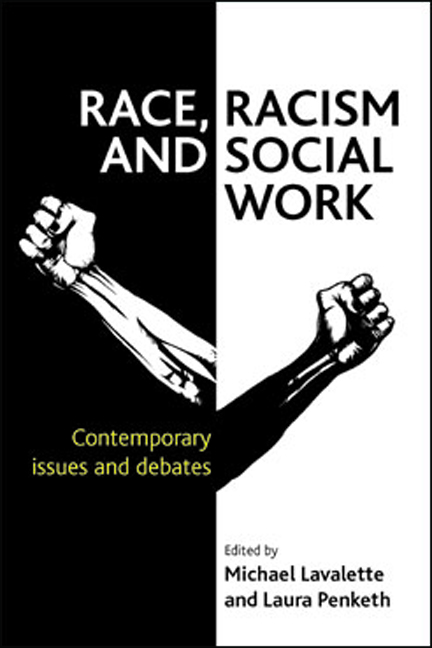Book contents
- Frontmatter
- Contents
- Notes on contributors
- Acknowledgements
- Dedication
- Some terms and definitions
- Introduction: Race, racism and social work
- one Rethinking anti-racist social work in a neoliberal age
- two The growth of xeno-racism and Islamophobia in Britain
- three The catalysers: ‘black’ professionals and the anti-racist movement
- four “Same, same, but different”
- five Antisemitism and anti-racist social work
- six Anti-Roma racism in Europe: past and recent perspectives
- seven In defence of multiculturalism?
- eight Social work and Islamophobia: identity formation among second and third generation Muslim women in north-west England
- nine Institutionalised Islamophobia and the ‘Prevent’ agenda: ‘winning hearts and minds’ or welfare as surveillance and control?
- ten ‘Street-grooming’, sexual abuse and Islamophobia: an anatomy of the Rochdale abuse scandal
- eleven My people?
- twelve Twenty-first century eugenics? A case study about the Merton Test
- thirteen The role of immigration policies in the exploitation of migrant care workers: an ethnographic exploration
- Conclusion: Race, racism and social work today: some concluding thoughts
- Bibliography
- Index
three - The catalysers: ‘black’ professionals and the anti-racist movement
Published online by Cambridge University Press: 01 February 2022
- Frontmatter
- Contents
- Notes on contributors
- Acknowledgements
- Dedication
- Some terms and definitions
- Introduction: Race, racism and social work
- one Rethinking anti-racist social work in a neoliberal age
- two The growth of xeno-racism and Islamophobia in Britain
- three The catalysers: ‘black’ professionals and the anti-racist movement
- four “Same, same, but different”
- five Antisemitism and anti-racist social work
- six Anti-Roma racism in Europe: past and recent perspectives
- seven In defence of multiculturalism?
- eight Social work and Islamophobia: identity formation among second and third generation Muslim women in north-west England
- nine Institutionalised Islamophobia and the ‘Prevent’ agenda: ‘winning hearts and minds’ or welfare as surveillance and control?
- ten ‘Street-grooming’, sexual abuse and Islamophobia: an anatomy of the Rochdale abuse scandal
- eleven My people?
- twelve Twenty-first century eugenics? A case study about the Merton Test
- thirteen The role of immigration policies in the exploitation of migrant care workers: an ethnographic exploration
- Conclusion: Race, racism and social work today: some concluding thoughts
- Bibliography
- Index
Summary
In this chapter Williams looks at the strategies for implementing anti-racist practice. In the 1980s the anti-racist social work movement argued that effective anti-racist practice would also require the significant recruitment of black and Asian workers who could challenge practice on the frontline and change the culture of social work organisations. Williams revisits some of the early debates of the 1980s and traces the history of the anti-racist social work movement, and the role of the early leaders. However, rather than an overt focus on policy regimes and bureaucracies, which many in the 1980s became concerned to focus on, she argues that we need to look at the practices and the networks of antiracist practitioners, ‘the catalysers’ who can bring about significant organisational changes to services.
Introduction
At various points in post-war history, the recruitment of black and minority ethnic individuals into the social services workforce has received government sponsorship for a number of reasons: to address labour shortages, for symbolic and tokenistic imaging of public service agencies or for its transformatory potential. The bedrock assumption of this latter line of argument is that altering the racial composition of the social service workforce ensures that services would become more attuned and, therefore, more accessible to the ‘special needs’ of black service users and act as a counter to institutional racism. This strategy has steadily gained in momentum in public services in the post-Stephen Lawrence era, with a range of public bodies and agencies seeking to attract representation from minority ethnic individuals within their ranks. In many ways social work, like education, was at the forefront of this trend from the 1970s onwards, signalling the key role minority workers could play in the production of so called ‘ethnically sensitive’ service delivery (ADSS 1978).
The decade from the early 1980s can be identified as a significant period of ‘black recruitment’ in social work, when largely left-wing Labour-controlled local authorities sought to incorporate the welfare demands arising from grassroots minority ethnic communities and political activists and translate them into local government equal-opportunities policies. This was overtly the liberal settlement of a central state seeking to deflect a tense and unsettled period of race relations.
- Type
- Chapter
- Information
- Race, Racism and Social WorkContemporary Issues and Debates, pp. 53 - 70Publisher: Bristol University PressPrint publication year: 2013



